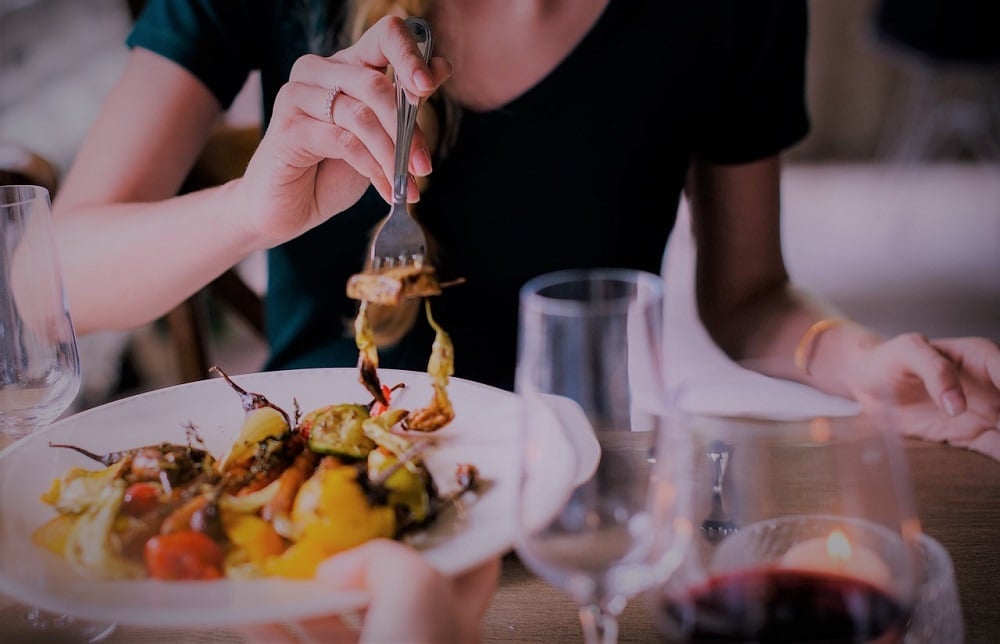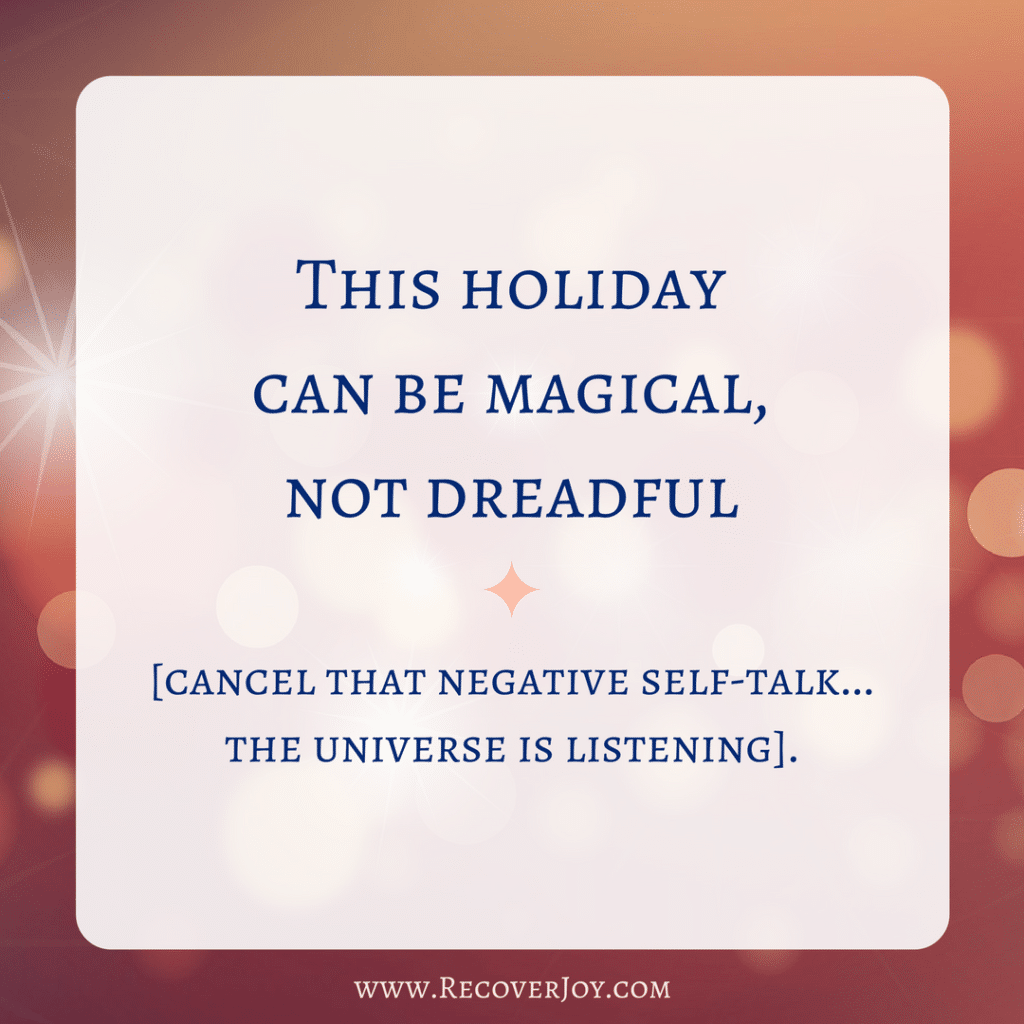If you have had struggles with food and are learning to live life differently— you are in recovery.
There are stages to recovery. I am speaking to the action and maintenance phase of recovery where you are no longer cancelling plans or denying food is a trigger. This is about all-in, you GOT this holiday, kind of recovery.
If you are aiming to live in the adult world and are practicing the daily art of valuing yourself from within, utilizing boundaries, asking for what you need and want, and you are living from a moderate energetic place in your life— you are in recovery.
This is certainly my daily aim… and sometimes a stretch; but it is my daily practice in recovery.
BTW: I’m cool with it looking or being imperfect.
Being in recovery from an eating disorder or struggles with food, body image, diet-culture, one-size ideals, and learning to shift into a recovery mindset requires a game plan…
… Especially during the holidays!
If you are like most, you have an entire storyline of how the big family event is going to unfold. It is true that the best predictor of the future is past behavior; BUT…
You aren’t the same person you were a year ago!
You have moved the line of understanding in your own awareness in regard to what works for you!
You are aiming to be recovered from your old messaging, and…
You aren’t the role played in the family you grew up in!
You may have to face that relative that is so focused on outward appearances and is grossly lacking in her containment boundaries, so much so that she blurts out how much weight you have gained or lost when she sees you walk through the door.
You may have to face the temptation of all the sweets and carbs and the anxiety that can trigger the old story—you know the one you have worked so hard to unlearn.
You might have to face questions on how you are doing with your recovery, as they look at you with worry and perceived pity in their eyes.
All of this is a possibility, and you can run the scenarios around in your head until you feel the panic settle in, but remember…
You are learning to have ninja skills when it comes to catching the negative thinking that comes from the old story you used to live in.
Your first step in maintaining your recovery mindset during the holidays is getting clear on what triggers impact your recovery. Your clarity is imperative to surviving the holidays; especially if you are going to be around the people that have been a past trigger for you leading you to use food or the lack of it to self-soothe.
As you think about the myriad of possible scenarios that could happen, it is perfectly acceptable to create a plan of action in response to how you might handle each possibility as long as it is sourced from you being the superhero to yourself in each scenario.
Clarity allows you to carve, sculpt, create, and author what this holiday looks like for you.
Here are seven questions to ask yourself as you dive into gaining clarity of what a recovered holiday means for you:
- What do I want this holiday to feel like for me? Can I meet this feeling for myself without placing expectations on others?
- Can I trust my intuitive self to have an experience free of expectation and control, and allow my internal compass to guide me?
- What am I unwilling to tolerate? What action am I willing to take to protect myself?
- Are there expectations that I feel are not based in choice?
- Am I able to maintain my sense of self when I speak my truth?
- Do I know and will I remember and maintain my boundaries? For how long, before I feel I need some alone time to recharge?
- Can I allow others to be responsible for their feeling state without wanting to rescue, fix, or change them? Am I willing to move the dial from selfless behavior to self-care and allow myself to feel the pinch of discomfort when self-care has me feeling…slightly bitchy?
As you get clear on how you internally regulate with your recovery mindset you will be better equipped to communicate your desires.
As you communicate your needs and wants with others over the holidays, it’s important to remember; not everyone has done the work of being in recovery. You may find yourself around others that believe they have a right to be intrusive, state facts that are more hurtful than helpful, they may criticize, judge, blame, and/or hold you in contempt when you honor your feelings over theirs.
Since you can’t control how others perceive or respond to your reality, you serve yourself by letting go of the outcome and using “I” statements when you communicate with others. Download the free feedback system I use to teach clients how to safely communicate with another in an effort to keep defenses low. And remember, if they have dysfunctional ways of relating, it is not your job to care-take them in lieu of your own self-care.
The important decision you get to make is whether or not you choose to communicate your needs to another person. If you stash and bury your emotions you don’t have a right to be in resentment because communicating your desires or reality is based in choice. If you choose not to communicate, you are using your containment boundary. Here is the fine line of the distinction:
In recovery, you choose who you spend time with and who you allow to see and understand the deeper aspects of you. If you have family members that aren’t going to listen to understand and are going to be defensive and dismissive, it may not be worth the energetic cost of communicating to be understood; but this can be based in choice vs. passivity and/or repression of feelings leading to playing the victim.
If you use the feedback system you will have a better chance of staying clear of reactive defenses as you are choosing to simply have someone else be a witness to your thoughts and feelings and offering them the chance to understand you better.
You get to decide how you internally boundary yourself from others that aren’t on the same path of wellness that you are.
If you find yourself getting overwhelmed, give yourself permission to take a time-out, away from the noise. Once you have done some breath work, anchored to your boundaries, and are regulated, you can venture back in.
If you need a little extra help with boundary work, you can read my post “What-IF” Game Got You Freaking Out? and download the guided meditation to help you set-up your internal boundary here.
If you are struggling with anxiety surrounding the impending holidays don’t hesitate to set up a coaching call here.
Lorri Lancashire is the founder of High Vibe Soul, LLC. a coaching program for women that struggle with recovery from food-related issues and negative body image. Lorri works as a mindset coach and is also a Masters clinician as a Licensed Professional Counselor in Texas. She has a private practice working with individuals and couples. Lorri is a Certified Eating Disorder Specialist through IAEDP (International Association of Eating Disorder Professionals). She has trained with Pia Mellody, the Beck Institute, and Terrance Real and is completing her training as an RLT therapist.
Click here to download Lorri’s free “I Am Solution” and begin to recover your joy!


